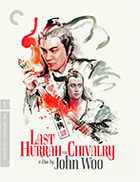Last Hurrah for Chivalry (Hao xia)
|  Although John Woo would come to be known as a preeminent director of exuberantly over-the-top action cinema in Hong Kong and later Hollywood, when he directed Last Hurrah for Chivalry (Hao xia), he was known primarily for comedies. The future director of such signature, genre-flexing films as The Killer (1989), Hard Boiled (1992), and Face/Off (1997) had apprenticed in his early twenties as an assistant director and script supervisor under prolific martial arts director Chang Cheh at Golden Harvest. He went on to co-write and direct a handful of martial arts movies in the early 1970s, including Hand of Death (1976), which helped launch Jackie Chan’s career. But, by the end of the decade he had found success in a series of comedies, the biggest being the box-office hit Money Crazy (1977) Thus, Woo’s writing and directing Last Hurrah for Chivalry, a relatively low-budget entry in the wuxia genre (historical-fantastical martial arts films), was a kind of one-off project. However, with hindsight, we can see how it integrates a number of the themes and stylistic flourishes for which he would later come to be known. Set in medieval China, it centers on the relationship between two swordsmen: Chang San (Wei Pak) and Tsing Yi (Damian Lau). Chang is a stern, formidable killer, while Tsing is a drunken goof, making them an unlikely odd couple whose budding friendship and then partnership is a staple of Woo’s unabashedly dramatic style of action cinema, which hinges heavily on camaraderie, sacrifice, and a deep sense of loyalty and honor. The film does not begin with Chang and Tsing, though, but rather with Kao Pang (Lau Kong), a wealthy young nobleman whose family is attacked in the film’s opening scene by the villainous Pray (Fung Hak-on, who also choreographed the film’s fight sequences). Kao swears vengeance on Pray, but he is not a good enough swordsman to follow through, hence his needing to hire Chang and Tsing. The plot, however, is not so simple, as various characters have hidden agendas and loyalties that lead to unexpected betrayals, although ones that are not insurmountable or unforgivable (the concept of grace is not insignificant here). As in many of Woo’s films, allies and adversaries are not always easily distinguishable and they sometimes swap positions. At its best, Last Hurrah for Chivalry transcends the limits of its budget and genre. At its worst, it is the prisoner of them. However, whatever flaws the film may have, it is clear that Woo was striving to expand the dramatic impact of the conventional Hong Kong swordplay film and write new rules for the narrative, notably by shifting away from a lone hero and focusing instead on a heroic friendship. Some of the film’s cheaper qualities—the bad wigs, the flat lighting, the obvious sets—detract from the overall impact, as do some of the awkward, dated bits of comedy; but, at other points, Woo’s budding stylistic gravitas and melodramatic sensibilities propel the film beyond its limitations. The film is bloody, but often beautiful in its artistry, and Woo’s poetic deployment of slow motion at crucial moments adds impact and gravity to the otherwise tried-and-true scenes of clanging swordplay. Had it not been directed by John Woo, it is likely that Last Hurrah for Chivalry would be largely forgotten amidst the dozens of similar films of its era. However, because Woo would go on to such international acclaim as he redefined what the action movie could look and feel like, it stands out as an important transition work, where a future master was working out the interplay of his stylistic and thematic obsessions.
Copyright © 2023 James Kendrick Thoughts? E-mail James Kendrick All images copyright © The Criterion Collection | |||||||||||||||||||||||||||||
Overall Rating: 

 (2.5)
(2.5)


